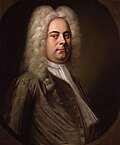Queen Caroline Te Deum
| Forma musical | obra de composició musical |
|---|---|
| Tonalitat | re major |
| Compositor | Georg Friedrich Händel |
| Estrena | |
| Estrena | 26 setembre 1714 |
El Te Deum en re major, "Queen Caroline" (HWV 280) és un canticle (càntic) compost per Georg Friedrich Händel el 1714.
Context històric
[modifica]Quan la Reina Anne va morir el 1714, el seu segon cosí l'Elector de Hannover esdevindria Rei de la Gran Bretanya com a Jordi I. La seva nora, Caroline de Ansbach, es va convertir en la Princess de Gal·les. Caroline va deixar Hannover i va viatjar a Gran Bretanya, fent l'únic viatge per mar de la seva vida, i arribà a Margate el setembre de 1714. La seva arribada es va celebrar amb la composició d'aquest Te Deum per part de Händel, qui vivia a Londres des de l'any 1712 i ja havia compost diverses obres per a la cort reial.[1] El Te Deum es va estrenar a la Capella Reial del Palau de Saint James el 26 de setembre, i es tornà a interpretar el 17 d'octubre.[2] Més tard, Caroline esdevindria Reina com a consort de Jordi II. Per això, el Te Deum compost per donar gràcies per la seva arribada es coneixeria com a Queen Caroline Te Deum (Te Deum de la Reina Caroline). El rei Jordi va assistir a l'execució del Te Deum i posteriorment va doblar la pensió de Händel que li havia concedit la Reina Anne; de dues-centes lliures a l'any per a tota la vida, passa a guanyar-ne quatre-centes.[3]
Estructura
[modifica]L'obra està escrita per a sis cantants solistes, cor i un conjunt instrumental que inclou una trompeta.
(Solistes, cor i orquestra)
- We praise thee, O Lord,
- We acknowledge thee to be the Lord.
- All the earth doth worship thee,
- The Father everlasting.
- To thee the angels cry aloud,
- The heavens and all the powers therein.
- To thee Cherubin and Seraphim continually cry:
- Holy, holy, holy! Lord God of Sabaoth,
- Heaven and earth are full of the majesty of thy glory.


(Solo de tenor amb orquestra, seguit per cor amb orquestra, i solo de baix amb orquestra)
- The glorious company of the Apostles praise thee,
- The goodly fellowship of the Prophets praise thee,
- The holy church throughout all the world
- Doth acknowledge thee,
- The Father of an infinite majesty,
- Thine honourable, true and only son,
- Also the Holy Ghost the Comforter.
- Thou art the King of Glory, O Christ,
- Thou art the Everlasting Son of the Father.
(Solo de contralt amb flauta dolça i orquestra, i cor)
- When thou tookest upon thee to deliver man,
- Thou didst not shun the Virgin's womb.
- When thou had'st overcome the sharpness of death,
- Thou did'st open the Kingdom of Heaven to all believers.
- Thou sittest at the right hand of God
- In the glory of the Father.
- We believe that thou shalt come to be our Judge.
- We therefore pray thee help our servants,
- Whom thou has redeemed with thy precious blood.
- Make them to be number'd with thy Saints in glory everlasting
- O Lord, save thy people and bless thy heritage,
- Govern them and lift them up forever.
(Solistes, cor, solo de trompeta i orquestra)
- Day by day we magnify thee,
- And we worship thy name for ever, world without end.
(Solo de contralt amb orquestra)
- Vouchsafe, O Lord, to keep us this day without sin,
- O Lord, have mercy upon us,
- O Lord, let thy mercy lighten upon us
- As our trust is in thee.
(Cor amb solo de trompeta i orquestra)
- O Lord, in thee have I trusted,
- Let me never be confounded.[2]
Estil musical
[modifica]Händel, un emigrant que recentment havia arribat a Gran Bretanya des d'Alemanya, va estudiar les obres d'Henry Purcell per aprendre com posar paraules en anglès a la música. El moviment inicial "Vouchsafe, O Lord", mostra una influència particular de Purcell, però la peça també inclou l'estil operístic que Händel va utilitzar en les obres escèniques, per exemple, amb l'ària per a contralt i flauta dolça, "When thou tookest upon thee."[2]
Enregistraments
[modifica]- James Bowman (contratenor), John Mark Ainsley (tenor), Michael George (baix), New College Choir Oxford, The King's Consort, Robert King (director). Hyperion Records CDA66315. (1989)
- Graham Pushee (contratenor), Harry Van Berne (tenor), Harry van der Kamp (baix), Alsfelder Vokalensemble, Bremen Baroque Orchestra, Wolfgang Helbich (director). Cpo Records 761203924424. (1995)
Referències
[modifica]- ↑ Keates, Jonathan. Handel: The Man & His Music. Random House UK, 1985, p. 85. ISBN 978-1845951153.
- ↑ 2,0 2,1 2,2 King, Robert. «Program notes for "Music for Royal Occasions'». Hyperion Records. [Consulta: 21 setembre 2013].
- ↑ Libbey, Ted. The NPR Listener's Encyclopedia of Classical Music. Workman Publishing Company, 2006, p. 304. ISBN 978-0761120728.
Enllaços externs
[modifica]- Te Deum en re major, HWV 280: Partitura lliure a l'IMSLP.

